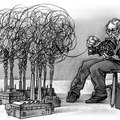NAGASAKI, Japan, April 20 — The shooting death this week of this city’s popular mayor has left people puzzling over the shooter’s motive and has set off a national outcry about a less savory aspect of Japanese society: its teeming criminal underworld.
On Friday, passers-by left flowers on the sidewalk where Mayor Kazunaga Ito, who went by the name Itcho Ito in public life, was killed Tuesday evening by a member of an organized crime group. Citizens also lined up to write their condolences at Nagasaki’s City Hall, where employees were wearing black dresses and neckties.
The brazenness of the slaying, in front of crowds of commuters at the city’s main train station, shocked this nation, which takes pride in its normally safe streets. It has brought growing calls in national newspapers and among ordinary citizens for Japan’s central government to take tougher steps to crack down on criminal groups.
“We can no longer let organized crime run rampant in Japan,” said Toru Shioyama, 36, who visited the site of Mr. Ito’s killing during his lunch break. “I’m outraged.”
Japan has some of the lowest crime rates in the world, yet it is not uncommon, especially in regional cities like this one, to see dark-suited gangsters openly swaggering down streets. Some gangs even announce their presence by hanging signboards outside their headquarters and carrying business cards.
In all Japan, there were some 84,700 known members of organized criminal groups as of March, according to the National Police Agency. By contrast, the Federal Bureau of Investigation estimates that there are only 1,000 “made” members of the Mafia, America’s best-known organized crime group.
For decades, Japan’s gangsters, known as yakuza, enjoyed a romanticized image here for their role in keeping crime under control. Historians say these groups often kept cozy relations with politicians and the police, and were a widely accepted part of the social fabric. But in recent years, public opinion has begun turning against them, as tougher economic times have driven the underworld to victimize regular Japanese more frequently, organized crime experts say.
According to the police, Mr. Ito, 61, was shot by a member of the Suishinkai, a local branch of the 39,700-member Yamaguchi-gumi, Japan’s largest organized crime group. The killer, Tetsuya Shiroo, 59, has confessed to shooting Mr. Ito twice from behind with an American-made revolver, the police said.
Mr. Shiroo’s motives are not clear. At first, many here thought the killing might have been politically motivated. Some speculated that Mr. Ito might have angered Japan’s murky far right with his opposition to nuclear weapons, a common stance in a city that was flattened by an American atomic bomb in World War II. In early 1990, another Nagasaki mayor was shot and wounded by a rightist after saying that the late Emperor Hirohito bore some responsibility for the war.
However, the police now appear to be investigating money-related disputes. The local news media have focused on a four-year-old clash between Mr. Shiroo and the city of Nagasaki over a car accident. In that dispute, Mr. Shiroo visited City Hall about 30 times from 2003 to 2005 to demand up to 2.7 million yen, or about $23,000, for damages to his car that he claimed were from an accident at a city construction site, city officials said.
Lawyers said such requests for reimbursement were a common form of extortion. However, the small amount of money involved, and the fact that Mr. Shiroo had not raised the matter with city officials for two years, made many wonder if there was not some larger, hidden issue. Adding to the mystery was the fact that Mr. Ito was in the final stretch of campaigning for re-election in Sunday’s mayoral election, which he was widely expected to win.
“We really have no idea what was the reason” for the slaying, said Yoshinobu Hashida, chief of the city’s personnel section, which advises city officials on how to deal with gangster threats. “There’s no clear-cut explanation.”
Another possibility is a dispute over public works projects, which lawyers and other organized crime experts call a common source of revenue for criminal groups. A letter signed by Mr. Shiroo and sent to a Tokyo-based broadcaster just before the shooting reportedly expressed anger at Nagasaki for denying a contract to a construction company with links to him. On Thursday, the broadcaster, TV Asahi, turned over the letter to the Nagasaki police.
It is also unclear why Mr. Shiroo chose the mayor as his target. Mr. Shiroo did not name the mayor during the traffic accident dispute, said city officials, and the TV Asahi letter reportedly mentioned him only briefly. Toshiaki Hayashida, the mayor’s chief secretary, said he believed that Mr. Ito had never met Mr. Shiroo.
Some experts said the killing might have been an act of desperation by gangsters, who have come under increasing pressure as Japanese companies and local governments have stepped up efforts to end dealings with organized crime. In recent years, Nagasaki has passed new regulations requiring companies to report all contact with organized criminal groups, or be barred from bidding on public works contracts.
Organized crime has also felt the pinch as Japan has reduced public works spending to rein in runaway budget deficits, say experts like Takashi Ozaki, a lawyer in Tokyo specializing in organized crime cases. Criminal groups have responded by increasingly turning to violence to intimidate local officials, Mr. Ozaki said.
“Incidents like the Nagasaki shooting show how tough it’s getting for these groups,” Mr. Ozaki said.
The National Police Agency said it was contacted 2,391 times last year in connection with violence against local government employees, an increase of 27 percent over the past six years. In Nagasaki, before this week’s shooting, city officials had been the victims of violence 13 times in the past four years, though not all of these involved members of organized criminal groups, said Mr. Hashida, the city personnel official.
In one case, a member of an organized criminal group was arrested after threatening a city official while demanding reimbursement for injuries he claimed he had suffered by stepping in a trap that the city had laid to control the local population of wild boars.
It is rare for a case to be as high profile, and as brutal, as Tuesday’s killing. After Mr. Shiroo’s arrest, the boss of the Suishinkai visited the Nagasaki police headquarters to report that the group was voluntarily disbanding, a possible sign that gangsters were bracing for a crackdown, the police said.
The police said the group had close to 100 members, making it the second-largest organized crime group in Nagasaki Prefecture, of which Nagasaki is the capital. Local police officials said that while they monitored the Suishinkai and other of the prefecture’s 555 known gangsters, they were powerless to arrest members until they actually broke a law.
“We can only act if they do something wrong,” said Yoshihiro Hara, a spokesman for the Nagasaki prefectural police. “We have to observe the rule of law.”
Meanwhile, at Mr. Ito’s former campaign headquarters, activity began picking up again. On Thursday, the campaign announced that Mr. Ito’s son-in-law, Makoto Yokoo, a 40-year-old reporter with no experience in politics, would run Sunday in Mr. Ito’s place.
“Sadly, some types of people resort to violence when they can’t get their way,” said Mr. Hayashida, the mayor’s secretary. “But we cannot let this stop us from pressing on.”




